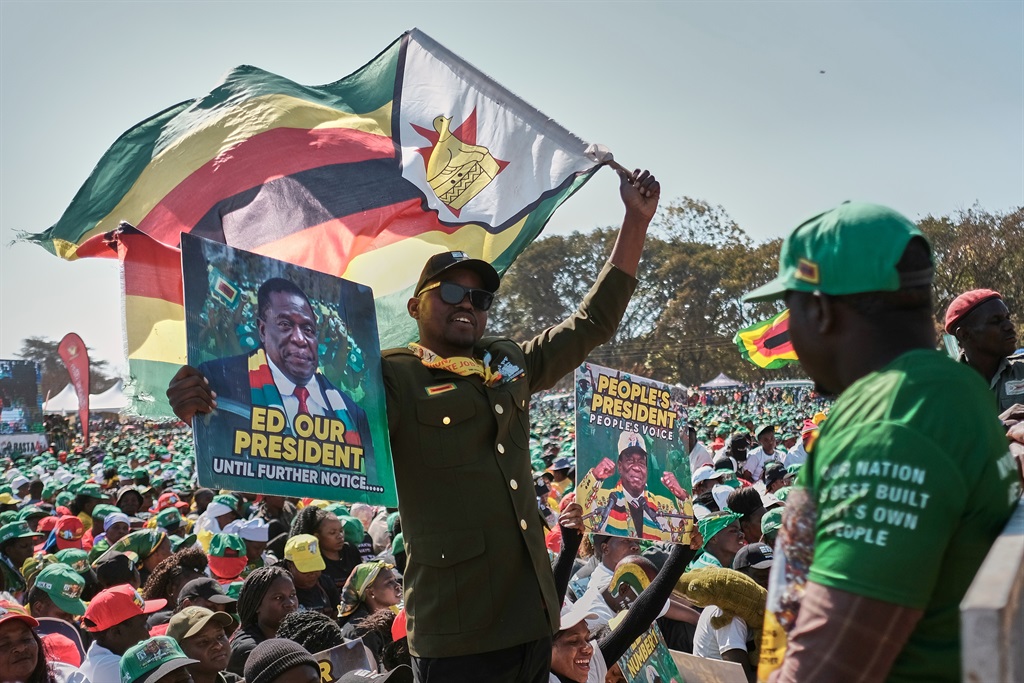

- Many registered voters say they would like to see change in Zimbabwe.
- This was revealed by a new mass opinion survey comprising 82% registered voters.
- According to the survey, 44% will refuse to take a bribe and will vote with their conscience, 40% will take the bribe and vote their conscience, while 11% will take the bribe and vote for the briber.
A new mass opinion survey says at least 77% of Zimbabweans want to see change.
The findings from the Public Policy and Research Institute of Zimbabwe (PPRIZ) are contained in a July survey made public two weeks before the general elections slated for 23 August.
A total of 82% of respondents were registered voters.
According to the survey, “the majority of registered voters (67%) say they are most likely to vote in the forthcoming election, while 9% say they will definitely not vote.”
About 65% of Zimbabwe’s electorate resides in rural areas, and according to the survey, that’s where the biggest vote will come from.
“Of those that are most likely to vote, more are from rural areas (53%) compared to 47% from urban areas.”
During the July 2018 polls, Zanu-PF enjoyed widespread support in rural areas.
But since the beginning of campaigns this year, Citizens Coalition for Change (CCC) leader Nelson Chamisa has dug deep into Zanu-PF’s strongholds, in some cases facing resistance.
In July, CCC spokesperson Fadzayi Mahere said rallies were “going to be predominantly in the rural areas”.
READ | ANALYSIS: The road to Zimbabwe’s tense general elections
However, there were challenges in farming communities where Zanu-PF has traditionally enjoyed landslide votes.
In Nyamandlovu, about 40km north-west of Bulawayo, News24 spoke to Julius Ncube, 58, a resettled farmer.
Ncube is a former soldier, although he didn’t participate in the war of independence.
He is open about his choices.
“I will vote for Zanu-PF as I have always done. We have land because of Zanu-PF, and without land, we are nothing. Now, if you tell me to vote for Western puppets, it’s like surrendering my life,” he said.
The narrative shared in rural and farming areas is that the CCC will return the land to “the whites”.
Another strongly held view is that the party called for sanctions, which is why the country was suffering.
President Emmerson Mnangagwa repeats this assertion in all his star rallies.
“Didn’t they call for sanctions? We can’t let our guard down, they even know coming here to campaign is dangerous,” added Ncube.
Ncube has been bused to Zanu-PF rallies in other parts of Matabeleland, and he enjoyed the experience, he said.
In farming communities and most rural areas, the only media residents have access to is state-controlled newspapers such as the Chronicle and state-run radio stations.
Some tune into shortwave radio to listen to the likes of Voice of America, which give a different view.
However, it’s somewhat taboo to be known to listen to pirate radio stations deemed anti-government.
In Bulawayo, there’s Cowdray Park, a new constituency where finance minister Professor Mthuli Ncube is doing the bidding for Zanu-PF.
The constituency is the biggest in Matabeleland with 70 000 residents, half of them are registered voters.
A lot of vote buying has allegedly been going on there through road construction, nurse aid courses for the unemployed and other social projects.
The constituency will put to test the traditional urban stronghold tag the opposition has enjoyed in the city.
READ | Zim elections: The only woman in the presidential race wants to see a functional country
Brave Manase, a vendor in Cowdray Park, said he welcomed the good work being done by Ncube, but that will be a challenge come voting day.
“Someone can vote for Ncube for parliament but not for President Mnangagwa for president. Or, like always, just don’t vote for Zanu-PF at all. But for our area, Prof Ncube has been good, and this presents a challenge for the opposition,” he said.
His view is similar to the PPRIZ survey, which highlighted that people said bribes were welcome, but might not change their voting perceptions.
“Forty-four percent say they will refuse to take bribes, and they will vote with their conscience, 40% will take the bribe and vote their conscience, while 11% will take the bribe and vote for the briber. Five percent are undecided whether to take the bribe or not,” the report said.
Sheila Moyo, 23, is in her final year of studies towards a diploma in hotel and catering.
She is a first-time voter and hopes to see change, but she does not entirely trust politicians.
“All I see are old people who don’t really care about us. All they want is to cling to money and power.
“On the other side, I see people who are hungry to enjoy what those in power have, and to be frank, their message is also weak. But in the end, change is good because if we can change the current leaders, we can easily change those that come in now if they are not good for us.
“We have seen governments change in Malawi and Zambia; we also want that experience,” she said.
Numerous other opinion polls predict a close call between Mnangagwa and Chamisa, with some raising fears of political violence after the results are announced.
The News24 Africa Desk is supported by the Hanns Seidel Foundation. The stories produced through the Africa Desk and the opinions and statements that may be contained herein do not reflect those of the Hanns Seidel Foundation.
